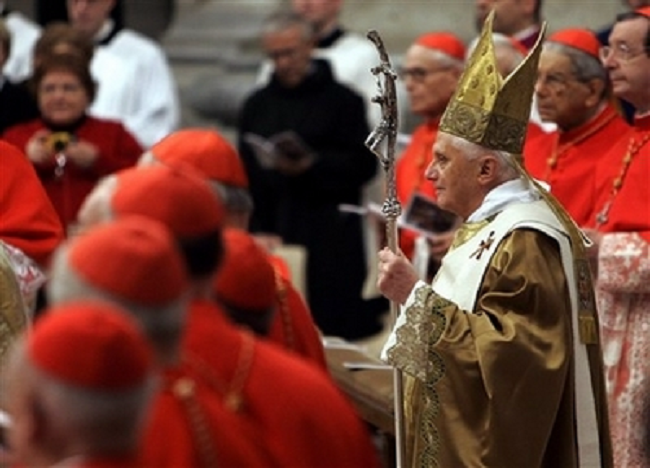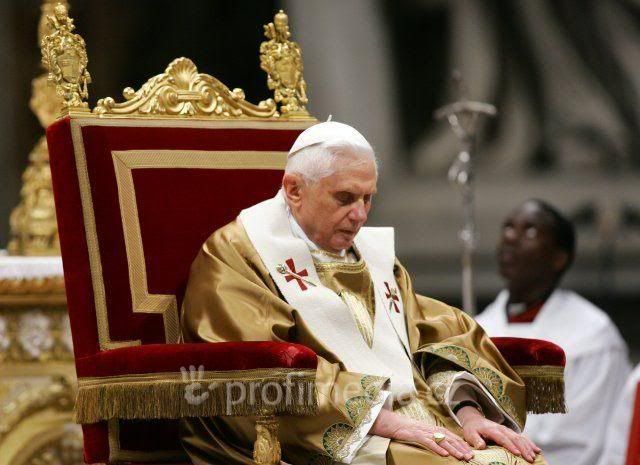s
Well the Holy Father had quite a Homily today. First check the whole thing out. It is quite beautiful and as always I feel like I have learned so much after hear Pope Benedict talk. Now at the end the Pope ties in statements to the scriptures he is citing to problems of Globalization. Let me say I think these statements might have been the strongest he has made on this topic. I let a friend borrow my book, Jesus of Nazareth, but If I recall right what he says today is even stronger. This indeed will be making headlines tomorrow in Secular papers. However be sure to read the whole homily. Thanks Again to the Ratizinger Forum for the translation. The pics are from today's Mass in Rome. These and more(including some from the Pope's Angelus) can be found in todays section of the Ratiingers Forum's News about Benedict subforum.
The Holy Father presided at Mass today at St. Peter's Basilica to celebrate the Solemnity of the Epiphany of the Lord. Here is a translation of his homily.
Dear brothers and sisters,
Today we celebrate Christ, Light of the world, and his manifestation to the peoples of the world. On the day of the Nativity, the liturgy said: "Hodie descendit lux magna super terram" – Today, a great light descends on the earth (Roman Missal). In Bethlehem, this 'great light' appeared to a small nucleus of persons, a minuscule representation of Israel: the Virgin Mary, her husband Joseph, and some shepherds. A humble light, in the manner of the true God; a flame lit in the night: a fragile newborn child, who wailed in the silence of the world... But that hidden and unknown birth was accompanied by a hymn of praise from the celestial ranks who sang glory and peace (cfr Lk 2,13-14).
And so that light, appearing so modestly on earth, projected powerfully into the heavens. The birth of the King of the Jews was announced by the rising of a star that was visible from afar. This was the testimony of 'some Magi', who arrived from the East in Jerusalem shortly after the birth of Jesus, in the time of King Herod (cfr Mt 2,1-2). Once more, heaven and earth, the cosmos and history, had called and responded to each other. The ancient prophecies found a correspondence in the language of the stars. "A star shall advance from Jacob, and a staff shall rise from Israel" (Num 24,17), the pagan seer Balaam had announced, when he was called to curse the people of Israel; but he blessed them instead because - God had revealed it to him - 'that people is blessed' (Num 22,12).
Cromatius of Aquileia, in his commentary on the Gospel of Matthew, placed Balaam in relation to the Magi, and wrote: "He (Balaam)prophesied that Christ would come; the latter saw him with the eyes of faith." And he adds an important observation: "The star was seen by everyone, but not everyone understood its meaning. Likewise, our Lord and Savior is born for everyone, but not everyone welcomes him" (ivi, 4,1-2). Here we see the significance, in the historical perspective, of the symbol of light applied to the birth of Christ. It expresses the special blessing of God on the descendants of Abraham, a blessing destined to extend to all the peoples of the earth. The Gospel event which we commemorate with the Epiphany - the visit of the Magi to the Baby Jesus in Bethlehem - thus refers us back to the history of the People of God, to Abraham's call from God in Chapter 12 of the Book of Genesis.

The first 11 chapters are like great frescoes that respond to some of mankind's fundamental questions: What is the origin of the universe and the human species? Where does evil come from? Why are there different languages and civilizations? In the initial accounts of the Bible, there is a first 'alliance', established by God with Noah after the flood. It is a universal alliance which concerns all of mankind. The pact with the family of Noah was also a pact with 'all flesh'. Then, before the call to Abraham, there is another great fresco that is very important in order to understand the meaning of the Epiphany: that of the Tower of Babel. The sacred text says that in the beginning, "all the earth had one language and the same words" (Gn 11,1). Then, some men said to each other, "Come, let us build ourselves a city and a tower with its top in the sky, and so make a name for ourselves; otherwise we shall be scattered all over the earth" (Gen 11,4). This is what Babel meant, and it was a kind of curse, similar to Adam and Eve being chased out of the earthly Paradise.
The story of benediction begins with the call to Abraham. God's grand design to make mankind one family begins with an alliance with a new people, chosen by him so that it would be a blessing among all the peoples of the world (cfr Gen 12,1-3). The divine plan is still being carried out but it had its culmination in the mystery of Christ. From then on, the 'last times' began, in the sense that God's design had been fully revealed and realized in Christ, but must be heard throughout human history, which is always, for God, a story of loyalty, but unfortunately, too, a story of unfaithfulness on the part of men. The Church itself, repository of God's blessing, is holy, even if it is made up of sinners who are marked by the tension between 'what is already' and 'what is not yet'.
In the fullness of time, Jesus came to bring the alliance to fulfillment: He himself, true God and true man, is the Sacrament of God's faithfulness to his design of salvation for all humanity, for us all. The arrival of the Magi from the East in Bethlehem, to adore the newborn Messiah, is the sign of the universal King's manifestation to all peoples and to all men who seek the truth. It was the start of a movement opposed to that of Babel: from confusion to understanding, from dispersion to reconciliation. Thus we see a link between Epiphany and Pentecost. If the Nativity of Christ, who is the Head, is also the birth of the Church, his mystical body, then we see the Magi as the peoples who join the rest of Israel, pre-announcing the great sign of the 'polyglot Church' activated by the Holy spirit 50 days after the Resurrection. God's faithful and tenacious love never falls short of his pact, from generation to generation. This is the 'mystery' which St. Paul speaks of in his Letters, as in the verse from the Letter to the Ephesians read today.
The Apostle affirms that such a mystery "was made known to me by revelation" (Eph 3,2) and that he was charged with making it known. This 'mystery' of God's loyalty constitutes the hope of history. Certainly, it is opposed by divisions and conquests that tear mankind apart because of sin and selfishness. In history, the Church is at the service of this 'mystery' of benediction for all mankind. In this mystery of God's loyalty, the Church fully absolves its mission only when it reflects the light of Christ the Lord and is therefore helpful to the peoples of the world on the way to peace and authentic progress. Indeed, the word of God revealed through the prophet Isaiah remains valid always: "...darkness covers the earth, and thick clouds cover the peoples; But upon you the LORD shines, and over you appears his glory" (Is 60,2). What the prophet announced to Jerusalem is fulfilled in the Church of Christ: "Nations shall walk by your light, and kings by your shining radiance" (Is 60,3). With Jesus Christ, the blessing on Abraham was extended to all the peoples, to the universal church as the new Israel who welcomes into her bosom all of mankind.

Even today, in many ways, the words of the prophet ring true: "thick clouds cover the nations' and our history. In fact, we cannot say that globalization is synonymous to global order - it is everything but that. The conflicts for economic supremacy and the monopoly of energy, water and raw material resources make the work difficult for those who are trying to build a just and fraternal world. The world needs a greater hope, which allows us to choose the common good over the luxury of a few and the poverty of the many. "This great hope can only be God... not any god, but the God who has a human face" (Spe salvi, n,31): the God who showed himself in the Baby of Bethlehem and in he who was crucified and resurrected.
If there is a great hope, then one can persevere in moderation. If true hope is absent, then happiness is sought in intoxication, in the superfluous, in excesses - and one ruins oneself and the world. Moderation is therefore not just an ascetic rule but also a way of salvation for mankind. It has become evident that only by adapting a moderate lifestyle, accompanied by a serious commitment to an equitable distribution of resources, will it be possible to install an order of development which is just and sustainable.
This requires men nourished by great hope and thus possessed of much courage. The courage of the Magi, who undertook a long journey following a star, and who knew to kneel before a Baby and offer him their precious gifts. We all need this courage, anchored in firm hope. May Mary obtain it for us in accompanying us on our earthly pilgrimage with her maternal protection. Amen.


















No comments:
Post a Comment